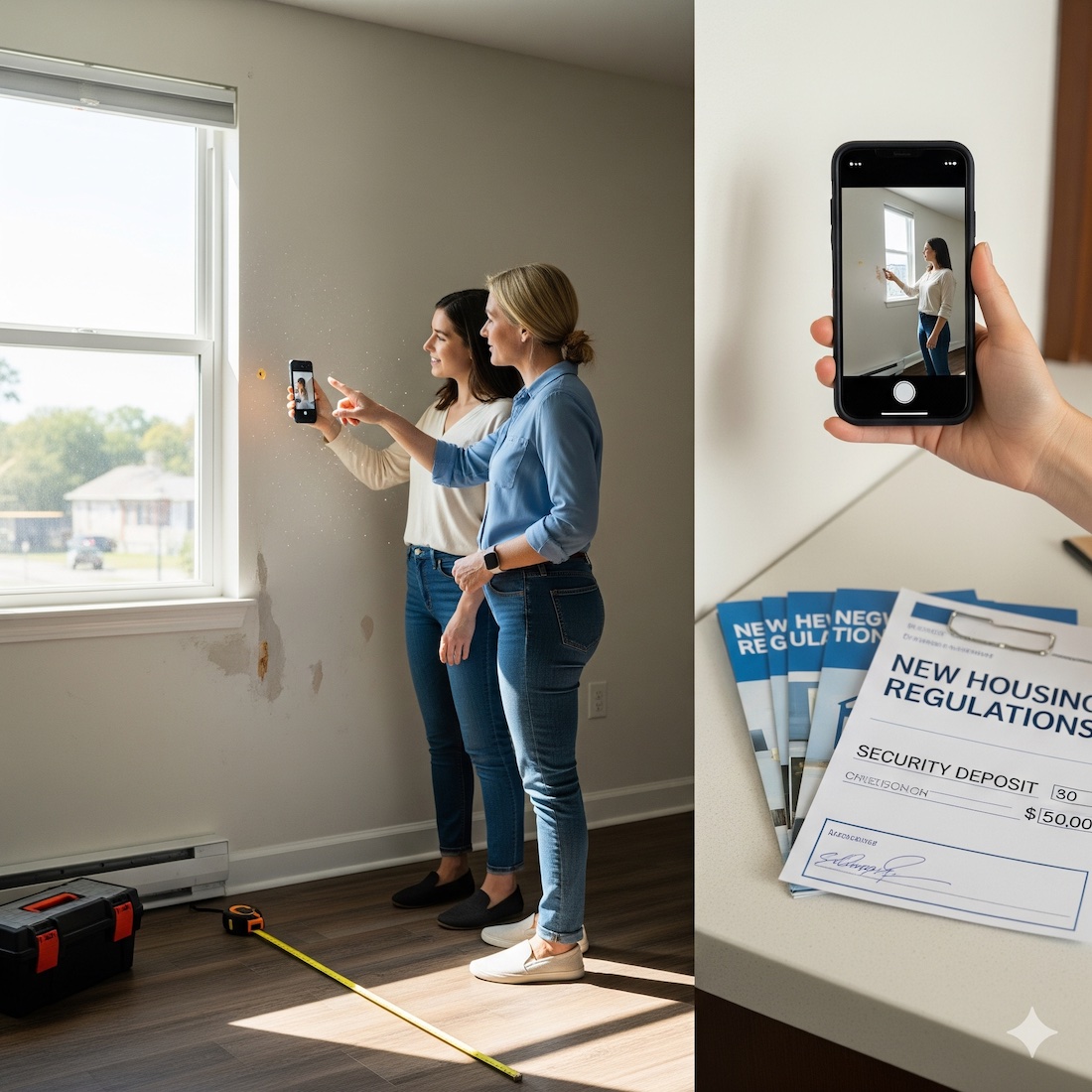
The waves breaking along the Santa Cruz shoreline aren’t the only forces of change this year. For landlords, tenants, and property managers across California—and especially here in Santa Cruz County—2025 has brought a new tide of housing regulations that will directly impact how we rent, manage, and live in our homes.
Santa Cruz is a community like no other. It’s where surf culture meets university life, where professionals commute to Silicon Valley while families put down deep local roots, and where a strong rental market supports all of the above. This diversity creates both opportunity and challenge: demand for housing is intense, turnover is high, and fairness in the market matters more than ever.
Taking all this into account, Governor Gavin Newsom stepped in and signed a series of housing laws back in 2024. These laws were set to officially kick in during 2025. They target three major themes: stronger tenant protections, greater transparency, and more stability in housing costs.
Inside this Article:
- Why These New Laws Matter
- Key Regulation #1: Security Deposit Documentation (AB 2801)
- Key Regulation #2: Positive Rental Payment Reporting (AB 2747)
- Key Regulation #3: Tenant Screening Fee Reforms (AB 2493)
- Key Regulation #4: Protections for Domestic Violence Survivors (SB 1051 & SB 611)
- Key Regulation #5: Rent Control and Affordable Housing Caps (AB 846)
Why These New Laws Matter
- By spelling out the rules on things like fees, deposits, how credit is reported, and when rent can go up, renters get a better sense of stability and know what to expect.
- Making things clearer with paperwork, notifications, and reporting helps cut down on arguments and builds trust between landlords and tenants.
- Keeping rents affordable through limits and smart screening helps stop sudden price jumps that could otherwise force families, workers, or students to leave their homes.
Here in Santa Cruz, the impact is especially real. UC students, local professionals, and families are all competing for the same limited stock of rentals. These new laws will shape daily rental practices—whether you’re renting a studio near campus, managing a beachside duplex, or overseeing a larger apartment complex downtown.
At its core, the state’s 2025 legislation is about creating fairer, more balanced housing relationships—giving renters peace of mind while guiding landlords toward clearer, more consistent practices.
Key Regulation #1: Security Deposit Documentation (AB 2801)
Few issues cause more friction between landlords and tenants than the security deposit. Was the carpet already stained? Did the tenant really cause that damage? Starting April 1, 2025, California’s AB 2801 aims to cut through the he-said-she-said with one simple tool: photos.
What the Law Requires
Landlords must now provide photographic documentation at three key stages of the tenancy:
- Before move-in – to establish the baseline condition of the unit.
- After move-out (before repairs) – showing exactly how the tenant left the property.
- After repairs are complete – documenting what work was done and why costs were deducted.
Tip for landlords: Time-stamped photos provide legal protection. Maybe pick up a smartphone app or use cloud storage to organize photos neatly, and it's a good idea to have a checklist to make sure you're consistent, no matter which property you're dealing with.
Key Regulation #2: Positive Rental Payment Reporting (AB 2747)
California rental laws keep evolving—and one of the newest changes, AB 2747, went into effect on April 1, 2025, and it’s a big shift: property owners must now offer tenants the option to have their rental fee payments reported to the major credit bureaus.
On paper, the goal is simple—help tenants build credit through timely rent payments. But for landlords, it means new responsibilities, notifications, and compliance rules.
What AB 2747 Requires
Here’s the quick breakdown:
- Tenant choice matters. If a renter opts in, you must report their payments—on time, late, or missed—to credit bureaus.
- Notification is mandatory. Every tenant must be told about the option at lease signing (or by April 1 for existing leases) and then reminded annually.
- Accurate records are essential. Landlords must keep precise payment histories, since errors could impact a tenant’s financial future.
- Follow state guidelines. California will regulate how and when these reports are submitted.
Who’s Exempt?
Small landlords with 15 or fewer units may be exempt—unless they own multiple properties or operate through an LLC, corporation, or REIT. Assisted housing developments are also carved out.
Notifications: The Fine Print
Notices can go out by mail or email, but mailed notices must include a prepaid return envelope. Tenants can opt in anytime, and they can opt out later (though they can’t rejoin for six months). Landlords may charge up to $10/month for the reporting service.
Why It Matters
For tenants, this law is a credit-building lifeline—especially for younger renters or those with limited financial history. For landlords, it’s more work, but it could also improve tenant relationships and give you stronger data for future screenings.
Santa Cruz Context
Credit reporting will be especially attractive to UC Santa Cruz students just starting their financial lives. Families and professionals looking to transition into homeownership also benefit greatly from this credit-building tool.
Tip for tenants: If your landlord offers this, opt in. Even a year of on-time reporting can boost your credit score significantly.
Key Regulation #3: Tenant Screening Fee Reforms (AB 2493)
If you’re a landlord in Santa Cruz, or anywhere in California, a new law is changing the way you handle rental applications. Starting January 2025, Assembly Bill 2493 (AB 2493) sets stricter rules around screening fees, refunds, and disclosures—and ignoring them could land you in hot water.
So, what’s new? AB 2493 keeps the existing cap on screening fees (around $62 per applicant, adjusted for inflation), but now requires landlords to choose between two approved methods:
- First-Come, First-Served: Process applications in the exact order received. Post your screening criteria upfront, review applicants fairly, and if the first one qualifies—you must offer them the lease. Refund any unused fees.
- Flexible Review with Refunds: You can consider applications in any order, but you must refund 100% of the screening fee to anyone you don’t select—within 7 days of choosing a tenant or 30 days of the application, whichever comes first.
Other key changes:
- No charging fees unless a unit is actually available.
- Applicants must automatically get a copy of their credit report within 7 days.
- Reusable screening reports are still valid—and if you accept one, you can’t charge a fee.
Tip for landlords: Be explicit in your listings about which option you use. Tenants appreciate clarity and it avoids confusion later.
Key Regulation #4: Protections for Domestic Violence Survivors (SB 1051 & SB 611)
Housing should be safe. For survivors of abuse, the law now provides urgent protections.
What the Law Requires
- Landlords must change locks within 24 hours of a valid request from a tenant with supporting documentation.
- Landlords must cover the cost of the lock change.
- Additional fees targeting vulnerable tenants are prohibited.
Why It Matters
- For landlords: A duty of care. Quick compliance avoids liability and builds trust.
- For tenants: Safety without financial barriers. Survivors gain immediate protection in their own homes.
Santa Cruz Context
Santa Cruz is a family-oriented, community-focused county. These protections reinforce the value we place on safety and compassion.
Tip for landlords: Build relationships with a locksmith you can call on short notice. Having a protocol in place shows tenants you are prepared and responsible.
Key Regulation #5: Rent Control and Affordable Housing Caps (AB 846)
Affordable housing has always been a hot-button issue in California—and starting June 2025, a new law aims to give renters in state-funded affordable housing more stability. Assembly Bill 846 (AB 846) sets clear limits on how much property owners can raise rent each year.
What the Law Says
For properties under the Low-Income Housing Tax Credit (LIHTC) program, annual rent increases are capped at the lower of:
- 5% + inflation (CPI), or
- 10% total.
That means no more steep jumps year over year—rent growth is limited, predictable, and tenant-focused.
Why This Matters
- For landlords: Revenue growth may slow, but stability goes up. Lower turnover means fewer vacancies and steadier operations.
- For tenants: No more fear of sudden, unaffordable hikes. Families, students, and workers in affordable housing get much-needed predictability and protection.
The Santa Cruz Angle
Santa Cruz has long struggled with housing access. From students to service workers, affordable units are vital for keeping our community balanced. With AB 846 in place, these homes will stay accessible and secure—helping prevent displacement in one of California’s tightest rental markets.
Practical Tips for 2025 Compliance
Landlords:
- Go digital with recordkeeping and payments to simplify compliance.
- Update your leases so new rules on deposits, fees, and reporting are clear.
- Consider professional support—local property managers can help navigate layered regulations.
Tenants:
- Learn your rights: you can ask about credit reporting, lock changes, and fee disclosures.
- Keep records—photos, receipts, emails—for peace of mind.
- Stay proactive—address issues early and with confidence.
Partner with Paul Burrowes for Top-Tier Santa Cruz Investments
Paul Burrowes, CRS, CCEC, SFR, NHCP, LHC, REALTOR® Licensed REALTOR® with over 15 years of experience and expertise. Commits to being on time and transparent. Acts as your consultant to ensure you make the best decisions to fit your transaction at every step in the process. Negotiates towards a low-stress, win-win outcome. Handles all the details for you, ensuring the hundreds of steps in your real estate transaction go smoothly. Proudly serving Silicon Valley, Santa Cruz, Monterey, and Santa Clara Counties! | DRE# 01955563 | (831) 295-5130 | paul@burrowes.com.
Posted by Paul Burrowes on

Leave A Comment